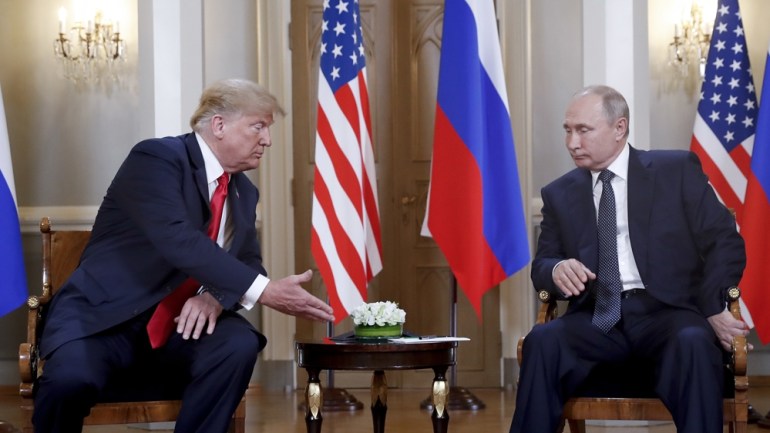United States President Joe Biden will cap off his European tour – his first foreign trip – with a meeting in Geneva on Wednesday with Russian President Vladimir Putin.
The highly anticipated summit, which the US began pursuing in April – days before announcing sanctions on Moscow and expelling diplomats over the Russian hacking of US federal agencies, “targeting dissidents or journalists”, and undermining security in the region – will be Biden’s first face-to-face meeting with Putin as president.
It notably comes before Biden has met Chinese President Xi Jinping, underscoring the continued relevance and perceived threat of Moscow to Washington and its NATO allies even as the Biden administration continues to reorient US foreign policy towards Beijing in what many consider an emerging cold war.
Increasing the urgency for Washington, he said, is the growing stance among some in Moscow that the US “is losing the geopolitical contest at the moment” which threatens to force Russia and China together.
Points of contention sure to top the US agenda will be so-called SolarWinds cyberattacks, the alleged Russian meddling in the 2016 and 2020 US Presidential elections, the Russian troop buildup on the border of Ukraine and its continued occupation of Crimea, the militarisation of the Arctic, and the alleged poisoning and imprisonment of Russian opposition figure Alexey Navalny.
On Wednesday, arriving in the United Kingdom for the first leg of the foreign visit, Biden warned of “robust and meaningful consequences” if Russia engages in “harmful activities”.
He repeated that sentiment at the NATO Summit in Brussels on Monday, adding if Navalny dies, his “death would be another indication that Russia has little or no intention of abiding by basic fundamental human rights, it would be a tragedy, it would do nothing but hurt relations with the rest of the world, and me”.
The language is in line with what observers expect to be a wider messaging and optics mission that aims to strike a stark contrast to former President Donald Trump’s July 2018 meeting with Putin in Helsinki.
 Then-US President Donald Trump extends his hand to Russian President Vladimir Putin in Helsinki, Finland, in 2018 [File: Pablo Martinez Monsivais/AP Photo]
Then-US President Donald Trump extends his hand to Russian President Vladimir Putin in Helsinki, Finland, in 2018 [File: Pablo Martinez Monsivais/AP Photo]That meeting ended with a now-infamous joint news conference that saw Trump, in real-time, accept Putin’s denial of Moscow’s interference in the 2016 US presidential election – a direct contradiction of the US intelligence community.
Meanwhile, Biden officials have in recent days sought to dispel criticism from some legislators and allies that the meeting is a reward for Putin, with National Security Advisor Jake Sullivan calling the summit “vital” in working towards “strategic stability so we can make progress on arms control and other nuclear areas”.
Brian Whitmore, a senior fellow at the Atlantic Council and host of the Power Vertical Podcast on Russian affairs, said in the widest sense, the Biden administration will be trying “to transform the relationship with Russia from what has been an unpredictable adversarial relationship into a predictable adversarial relationship”.
‘Personally assess’ the other leader
The White House and Kremlin have taken pains to lower expectations surrounding the summit, with officials from both countries repeating the mantra of “no breakthroughs, no illusions, no false expectations” said Robert Legvold, a Columbia University professor emeritus of political science.
He added that despite having a history of face-to-face meetings that dates back at least 20 years, the first meeting between Presidents Biden and Putin will largely be a recalibration.
“Each leader thinks they know the other leader well, but they need to update, and that may be as significant as anything else in terms of low expectations,” Legvold said. “That may not be positive. They may come away with the conclusion that ‘no, we’re not going to be able to do a lot of business’.”
Challenges to engagement remain myriad. The two leaders traded barbs when Biden, on being asked by a reporter in March, affirmed that he believes Putin is a “killer”.
Meanwhile, Ukraine has said Russia continues to maintain a large military presence along their shared border despite announcing a pullback in April.
Such realities underscore how difficult it will be for the Biden administration to make progress on its goals, particularly when Moscow may not see a more predictable relationship as working to its benefit, the Atlantic Council’s Whitmore said.
“I don’t think Russia wants a stable, predictable relationship,” he said. “I think the unpredictability of the relationship is actually Putin’s asymmetrical advantage.”
Possible cooperation
Still, with both sides uncomfortable with the Cold War-era low in relations, some observers believe there is a motivation to find at least some common ground.
While little is expected in concrete steps, an agreement to redeploy diplomats, including the US and Russian ambassadors, who have been called back to their home countries, is considered one possible outcome.
Other global issues like COVID-19 and climate change – with the US and Russia representing the number two and four top carbon emitters in the world, respectively – are seen as possible areas of cooperation.
University of Kent’s Sakwa said, with some luck, the meeting could follow the pattern of the summit between Secretary of State Antony Blinken and Sullivan and their Chinese counterparts in Alaska in March, which saw initially harsh words give way to two hours of “very constructive discussions”.
While both parties are entering the meeting with “open eyes”, he added: “I do think that this is good faith engagement.”



